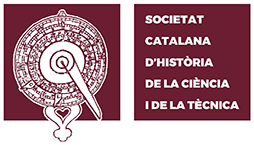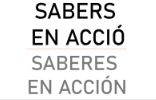Entrevistes
Entrevista a Dolors Aleu (1857-1913)
“Aquesta obsessió per fer-nos belles ens acaba fent mal… i no només físicament” Per Núria Pujol, amb la col·laboració de Sara Fajula i Consuelo Flecha Dolors Aleu és nascuda i criada a Barcelona, de pare prioratí i mare barcelonina. Seguint els passos d’Elena Maseras,...
Entrevista al teatre anatòmic (1760)
Des que el món es món el part havia estat assistit per dones, i ara venen ells a ensenyar-les a elles com ho han de fer? Per Núria Pujol Nascut el 1760 i criat a Ciutat Vella de Barcelona, a l’oest de les Rambles, al carrer del Carme, pot dir que s’ha mantingut ferm...
Entrevista fictícia a Galè (129 d.C.-216 d.C)
“Si no ets filòsof no ets metge, ets un mer receptador” Per Mónica Durán i Núria Pujol Galè (129 dC-216 dC), natural de la ciutat de Pèrgam, a Àsia Menor, va fer els seus primers passos en el terreny mèdic a l’Asclepeion de la seva ciutat. Va treballar durant més de...
Entrevista a Laura Martínez de Guereñu, arquitecta e historiadora de la arquitectura
“Los arquitectos construimos la historia físicamente” Per Núria Pujol y Júlia Massó Entrevistamos a Laura Martínez de Guereñu, que el pasado 11 de marzo nos deleitó con su coloquio Resultados de investigación implementados como intervenciones artísticas: La obra de...
Entrevista a Laia Abril
“La historia es la psicóloga de nuestra sociedad” Captura de la Laia Abril durant l’entrevista. La fotògrafa, periodista i artista, Laia Abril, va donar una conferència emmarcada dins dels col·loquis de la SCHCT del curs 2020/2021: “A History of Misogyny”: recerca,...
Entrevista fictícia a Maria Monclús Barberà (1920-2012)
“Les universitats han de ser llocs per aprendre, però també per a treballar en igualtat” Per Núria Pujol, 22 de juliol de 2021 Maria Monclús, lleidatana de naixement, es va llicenciar en ciències naturals per la Universitat de Barcelona (1945), institució a la qual va...
Entrevista a Sebastian V. Grevsmühl, science historian
“The cold war was fundamental in the idea of the global environment” Per Núria Pujol i revisada per Júlia Massó 10 de febrer de 2021 Last 10th February, Sebastian V. Grevsmühl delighted us with his talk “Exploring the borders of lab and field sciences in Antarctica:...
Entrevista a Albert García Espuche
“Eliminar drets amb el pretext de fer més segura la situació és un engany majúscul” Per Júlia Massó 21 de juliol de 2020 1. Quan la pesta de 1651 arriba a Barcelona es produeixen dos fets rellevants: ja feia gairebé un any que se’n tenien notícies de la seva...
Entrevista a Ludmilla Jordanova
“The past is inevitably part of the present” Per Júlia Massó El passat 20 de febrer de 2020, Ludmilla Jordanova va fer la ponència “Collections and Display: the Royal College of Physicians in London”, dins del cicle “Objectes perduts. Explicar i exposar ciència a...
Entrevista a Leo van Bergen
“En la medicina en temps de guerra, la prioritat és l’exèrcit, no el pacient” Per Leo Clements Leo van Bergen és un expert en medicina militar i membre del consell editorial de la revista acadèmica internacional Medicine, Conflict and Survival, que tracta temes com...
Entrevista a Emilia Musumeci
“Césare Lombroso (1835-1909)” Per Òscar Montero E: En què es basaren les teories de Lombroso? E.M: Lombroso cercà l’origen biològic de la delinqüència i per tant, les seves explicacions es basaren, gairebé exclusivament, en la biologia i en les diferenciacions que...
Entrevista a David Edgerton
“Communicating Science: Pleasures and Pitfalls of Historical Narrative” Per Jaume Valentines Álvarez i Jaume Sastre Juan E:“The Shock of the Old” has shocked historians because of its project on global history. Does global history go far beyond from the sum of local...
Entrevista a Katherine Watson
“The history of forensic medicine in the West: overview and prospect” Per Mar Cuenca Lorente E:How does legal medicine contribute to this historiography on experts? What can it show us? K.W: If someone is called an expert I would like to know more about what they are...
Entrevista a Montserrat Cabré
“Les dones en la Història de la Ciència: d’objecte d’estudi a subjecte que coneix” Per Amparó Bruñó Martí E: Quina és la principal dificultat a l’hora d’estudiar el paper que han tingut les dones en la Història de la Ciència? M.C: Quan començava a fer recerca, ara fa...
Entrevista a Paola Govoni
“Communicating Science: Pleasures and Pitfalls of Historical Narrative” Per Miquel Carandell E: What do you think about the current state of science popularization? What role should history of science play in science popularization? P.G: In my opinion history of...
Entrevista a Patricia Fara
“Communicating Science: Pleasures and Pitfalls of Historical Narrative” Per Amparo Bruñó i Pedro Ruíz-Castell E: You manage to summarize in your last book a four thousand year history into four hundred pages. How did such a project come to your mind and how was it...
Entrevista a Peter Bowler
“Making Modern Science: A Historical Survey” Per Clara Florensa E: Which is, in your opinion, the aim of a textbook in history of science? I mean, do you think is important to communicate the discipline? P.B: Sure, I think it is important, because science is important...
Entrevista a Pepe Pardo
“Un lugar para la ciencia: Escenarios de práctica científica en la sociedad hispana del siglo XVI “ Per Gustavo Corral E:Com es treballen les fonts utilitzades per elaborar un llibre que parla de la pràctica científica del segle XVI? En el seu cas, cóm procedeix en la...
Entrevista a Patricia Fara
“How Newton is seen depends on us just as much as on Newton himself” Per J. Agustín López Martínez E: Is it possible to appeal readers with a history without heroes? P.F: That’s a problem. Most of the books tend to be about heroes or famous names like Newton or...
Entrevista a Jaume Sastre-Juan
“La innocència de prémer un botó: algunes claus per a una història de la interactivitat” per Alfons Zarzoso Parlem amb Jaume Sastre-Juan sobre la genealogia de la interactivitat als museus de ciència.Reproduïm aquí una conversa informal (entrevista feta per Alfons...


